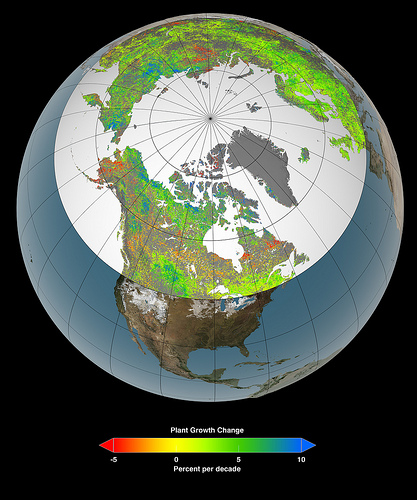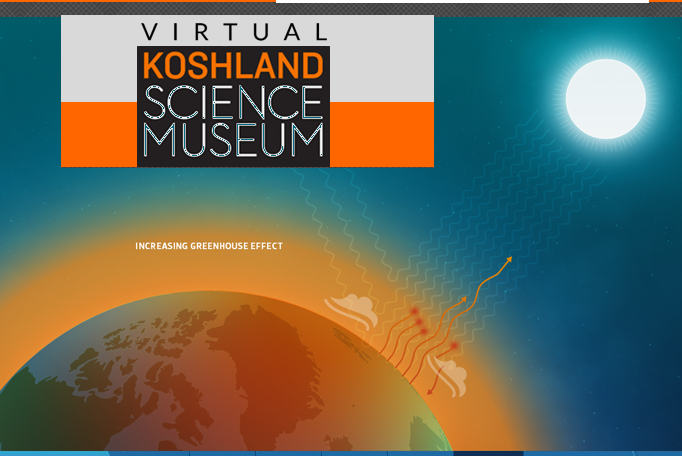Enhanced Greenhouse Effect.
 Experiment to demonstrate the Greenhouse Effect
Experiment to demonstrate the Greenhouse Effect
Beginning with a short introduction / recap of the greenhouse effect, this simple experiment illustrates the principles of the greenhouse effect. Heating beakers of gases using sunlight or even bright lamps shows the different properties of the gases. Students can obtain surprisingly good results on a sunny day. There is also a set of sample results, just in case it rains, and the lesson could be a data analysis opportunity.
Lesson Description
Guiding Questions
Which gases are greenhouse gases?
What type of radiation do they absorb?
Is it possible to see this effect in the lab?
Activity 1 - Introduction to the Greenhouse Effect
What is the greenhouse effect and how is it warming the earth?
Activity 2 - Experiment to demonstrate the greenhouse effect in the lab
Carry out the experiment on the ![]() Greenhouse Effect Experiment worksheet below.
Greenhouse Effect Experiment worksheet below.
Does the data you collect support the idea of the greenhouse effect?
Extension
If you have time try repeating the experiment using methane gas from the gas taps or exhaled air. Both of these are rich in greenhouse gases. (Beware: evaporation and condensation of water vapour in exhaled air cause temp. changes too.)
Activity 3 - Explaining the experiment
Listen to the description of the atmosphere's effect on short wavelength radiation (including light) and longwave radiation (Infra-red ratiation or heat).
Introduction to long and short wavelength radiation.
| Follow the illustrations on the six screens of animation from the Koshland Science Museum |
Write a description, giving details of long wave and short wave radiation, of how the greenhouse effect keeps the Earth warm, and how an enhanced greenhouse effect can increase the Earth's temperature.
Questions
How does the greenhouse effect keeps the Earth warm? (4 marks)
.............................................................................................................................
.............................................................................................................................
.............................................................................................................................
.............................................................................................................................
Why does an increase in carbon dioxide concentration cause global warming? (2 marks)
.............................................................................................................................
.............................................................................................................................
Teachers notes
There are a few alternative ways to do this experiment.
Here are a few suggestions:
- Use data logging probes which work well if you can take them into the sunshine.
- Use large conical flasks and bungs with thermometers fitted. This keeps the gases in place much better than beakers. Turning the conical flasks upside down would make it possible to balance the petri-dish of water on top, to absorb infra red radiation from the lamp or the sun. Retort stands could be used to hold the conical flasks in place.
- When trying exhaled air the results don't work very well on a cold day. I think this may be to do with faster heat loss, or else energy changes caused by water vapour condensing and then evaporating again.
Climate change resources
There are so many good resources to choose from. It is impossible to include everything.
Here are some alternatives:
- Wonderful resources about climate change and global warming here from Annenberg Learner.
- "Climate Change, Lines of Evidence" series by the Board on Atmospheric Sciences and Climate is a bit longer, but also excellent.
- There are nice stories and a campaign from young people
: Climate changein the video The View From MinuteEarth #OursToLose
Climate changein the video The View From MinuteEarth #OursToLose
How could a page about climate change not include a link to Greta Thunberg's speech to COP 24.![]() Greta Thunberg's speech to COP Dec 2018
Greta Thunberg's speech to COP Dec 2018
“This is above all an emergency and not just any emergency.
This is the biggest crisis humanity has ever faced.
This is not something you can like on Facebook.”
Greta Thunberg
at 'Climate Kirtag', Austrian World Summit, May 2019.
There is a nice set of 'superhero' cards for the greenhouse gasses on this NASA Meet the Greenhouse gases website, which could be nice to use in a class research activity. Student could take one card, research details bout this greenhouse gas, and report back to the class 10 minutes later.

 IB Docs (2) Team
IB Docs (2) Team

